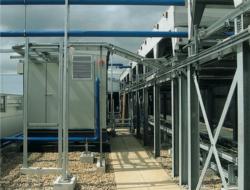Ammonia and hydrocarbons provide air conditioning and cooling at Roche headquarters

This packaged ammonia chiller is one of three designed by Star Refrigeration to provide air conditioning for the new Roche headquarters at Welwyn Garden City.
Chillers using ammonia and hydrocarbons have been designed and installed by Star Refrigeration at the new 21 800 m2 headquarters of Roche Products at Shire Park in Welwyn Garden City. Two packaged ammonia chillers provide general building cooling. They are located on the roof of the building and have ambient air-cooled condensers to boost efficiency. Each chiller has a cooling capacity of 930 kW. Three hydrocarbon chillers were developed to serve computer-cooling requirements. Each of these chillers has a cooling capacity of 130 kW and operates with improved performance at average ambient temperatures. All five chillers have leak-detection and alarm systems to minimise health-and-safety risks. Each chiller also has a PLC control system for reliability and continuous operation. This new facility houses the company’s pharmaceutical business. Environmental sustainability was a guiding principle in the design and construction of this project. Energy-efficient cooling for the air-conditioning system was key to achieving the high environmental standard and reduced carbon emissions required. The project team of Roche, Meica and BDP chose Star as the team’s partner for refrigeration engineering. The project has received a major award in this year’s Cooling Industry Awards.
Related links:


